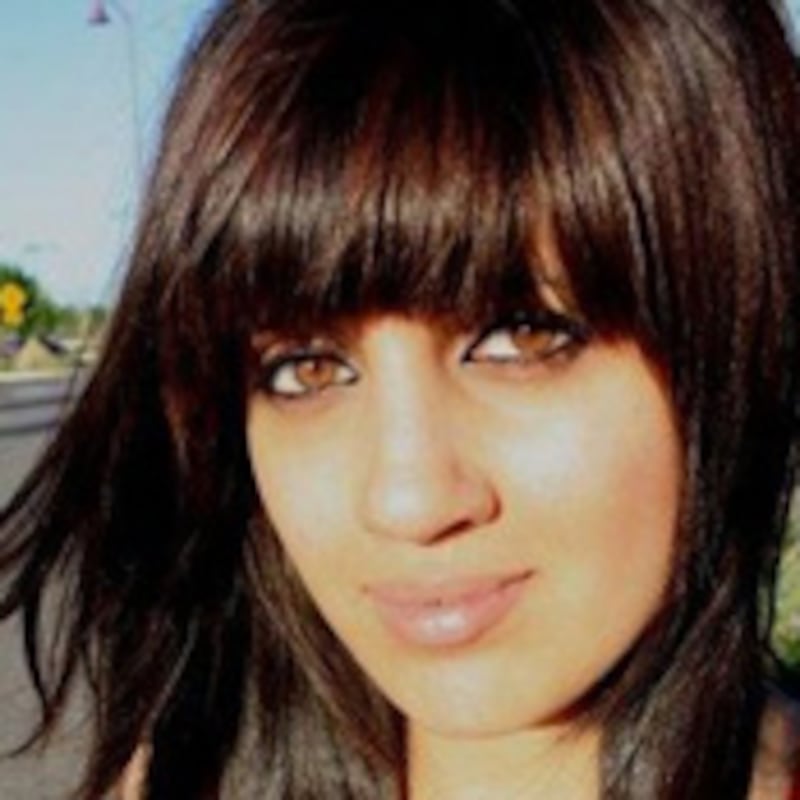
When I heard the tragic news this week that a beautiful young Muslim woman, Noor Almaleki, 20, had died after allegedly being run over by her Iraqi-American father, Faleh Hassan Almaleki, for being too “Westernized,” I returned to a moment five years ago when I sat on the carpeted floor of my hometown mosque in Morgantown, West Virginia, just a block from the McDonald’s.
As I listened in horror, an Egyptian-American professor of engineering railed against the “dark path” of the West.
“The suspect was very mad at his daughter as she had become too Westernized and was failing to comply with their traditional Iraqi values.”
“O servants of Allah!” he declared. “Imitating polytheists and atheists in their clothing, customs, rules, politics, and economics has become widespread among many Muslims to a very large extent, so much so that the one who blindly imitates and tries to Westernize might even be respected by the foolish masses and the youth, including the rich, intellectuals and even the poor, who are attracted to such a person. Woe to imitation and subordination! What weighty and oppressive constraints they have! What a dark path theirs is! What a great loss for whoever follows them!”
Lest we miss any subtleties, he blasted the “disgraceful women” of the West.
Noor’s father allegedly ran her over along with another woman, Amal Edan Khalaf, as the two were walking across a parking lot at the Arizona Department of Economic Security, next to a local joint, Carolina’s Mexican Restaurant. Family and friends told police Noor had left an arranged marriage in Iraq to move in with a boyfriend; Amal was her boyfriend’s mother.
Veteran Peoria, Ariz., police spokesman Mike Tellef told me, “The suspect was very mad at his daughter as she had become too Westernized and was failing to comply with their traditional Iraqi values.” Noor’s brother told a local Phoenix TV reporter that his sister had also upset his father’s conservative Muslim values.
It's a message I heard regularly at my Morgantown mosque. From the pulpit another Friday, I heard the same professor’s Ph.D. student, a young man from Egypt, declare: “A Muslim woman should keep aloof from those callers who ask her to forgo her morals, asserting that practicing free sex is a biological process that has nothing to do with morals. To us Muslims, a woman’s honor lies in her chastity and modesty. Once she loses her honor, she is worthless.”
Each time, I sat stunned. This message completely contradicted the Islam my parents had taught me that honored and respected the best of the West while accepting that all societies aren’t perfect.
But it was no wonder some time later, when the local newspaper ran a photo of the engineering professor’s son in handcuffs, arrested for driving the wrong way down a one-way street, trying to ram his teenage sister’s car. Her sin: dating a high school classmate, a Morgantown High School football player, who happened to be a white Christian boy.
To me, that alleged crime was an “honor assault,” bred and fed by an ideology that demonizes the West, ironically by people who are often the beneficiaries of the West. And there is no doubt in my mind: Noor Almaleki’s alleged murder was an “honor killing,” or in the lexicon of activists who are trying to challenge the ethos of these crimes: a “so-called honor killing.”
While so-called honor killings are universal crimes of violence carried out by people of all faiths, from Sikhs and Hindus to Christians, Noor is a victim in the culture wars between a puritanical interpretation of Islam and the West.
To some, it is politically incorrect to make such an assertion, but to me, it is socially irresponsible not to identify the ideology that inspires violence against women like Noor. This demonization of the West emerged in the 20th century with architects of political Islam, such as Sayyid Qutb, the Egyptian thinker who wrote the book Milestones while in prison in Egypt, branding the West a “rubbish heap” after a trip to the United States. The proponents of this version of political Islam see a world in which harshly puritanical interpretations of Islam prevail—and where young women like Noor Almaleki aren’t allowed to live and love as they choose.
Where did the sermons at my mosque in West Virginia come from? They were downloaded from AlMinbar.com, a Web site administered in Saudi Arabia. The site is slick, and it disseminates prefab speeches of political Islam by clerics in Saudi Arabia. It calls itself the “orator’s garden and the Muslim’s provision” and follows the Wahhabi school of Islam preached in Saudi Arabia.
The notion of the West on a “dark path” comes right out of sermon No. 184. The sermon about unchaste women as “worthless” was sermon No. 678 on Al Minbar’s Web site. In that sermon, the engineering student included a reference to “a friend” who married a virgin and not a girlfriend he’d had sex with, because the girlfriend didn’t deserve his respect. In fact, the student had no such “friend.” His reference was lifted straight from the online sermon.
Both sermons are still available today. Like the famous dummy of Vaudeville ventriloquist Edgar Bergen, these Muslim preachers in the U.S. are the proverbial Charlie McCarthy of puritanical Islam. And where does this ideology trickle down? To men like Noor Almaleki’s father.
Many ideologies of tribalism and traditionalism inspire so-called honor killings, from Jordan to America, where honor is a form of currency, giving families access to resources, status, and clout. In this value system, if you don’t have honor, you’re exiled from the social group, and it typically threatens a man and his lineage. In this equation, women represent reproduction and a family’s lineage.
On one side, women may be seen as property, but on the other side, they are seen as vessels of the family honor. That’s why all of these taboos about virginity have emerged.
Honor has been part of a cultural DNA that kicked Eve out of the Garden of Eden and made Hester Prynne a believable fictional representation of puritanical America. Sadly, in the 21st century, it remains a force in many immigrant communities from Germany to Arizona.
Rana Hussaini, a journalist with the Jordan Times, heard about Noor’s death while on book tour for a powerful new book, Murder in the Name of Honor, which documents the tragic phenomenon that claims an estimated 5,000 lives a year, according to United Nations numbers that experts consider conservative. Hussaini says Noor’s murder underscores the pressures that some immigrant parents and communities put on children to conform to traditional values.
“It’s unfair to put children in this conflict,” she said. “If you cannot live in this society, don’t migrate. People who are not ready and willing to respect the countries they go to, and respect the laws and don’t want their children to go through this new kind of life, should not migrate to the West. It’s unfair to put children in this conflict.”
She added: “Murder does not solve the problem. What did the father gain? He destroyed the family for what? This is just so sad. This murder is against all religions. Nobody has the right to take the life of anyone for any reason.”
Sadly, she writes in her chapter “Honour in the USA,” “Immigrant communities in the USA are seemingly reluctant to draw attention to a phenomenon they feel will exacerbate the hostility already directed to them since 9/11 and the onset of the wars in Afghanistan and Iraq.”
But across town from where Noor was killed in Phoenix, Dr. Zuhdi Jasser, a physician and founder of a group called American Islamic Forum for Democracy, said it’s incumbent on Muslim communities to take responsibility for the expressions of ideology and interpretations of sharia, or Islamic law, that demand rigid conformity and demonize the West.
“Political Islam and sharia represent a collectivist mindset that dominates and suppresses the rights of the individual through an imposition of what they view as morality,” he said. “They are suffocating the identities of individuals. They dehumanize their daughters,” allowing crimes such as Noor’s murder.
Ironically, in the 7th century, when Muhammad, the prophet of Islam, brought the religion to tribal Arabia, he banned a practice of burying daughters in the sand, a tradition associated with the time of “Jahiliyya,” or ignorance and darkness.
Sadly, in the 21st century, we’re still allowing the life breath of too many of our daughters to be suffocated because of a need to assert power and control over their lives. And the life of Noor, a young woman whose name means “light,” was extinguished because we have failed as a society to protect our daughters.
It’s critical that we remove from our communities the ideologies that lead us down the slippery slope to violence. Otherwise, we are the ones on the “dark path.” Noor’s fate reminds us that we need to choose the path of light.
Get Involved: For more information on organizations doing work globally on honor killings, go to http://www.ranahusseini.com/Links.html.
Asra Q. Nomani is the author of Standing Alone: An American Woman’s Struggle for the Soul of Islam. She is co-director of the Pearl Project, an investigation into the murder of Wall Street Journal reporter Daniel Pearl. Her activism for women’s rights at her mosque in West Virginia is the subject of a PBS documentary, The Mosque in Morgantown. She can be found on Facebook, and reached at asra@asranomani.com






